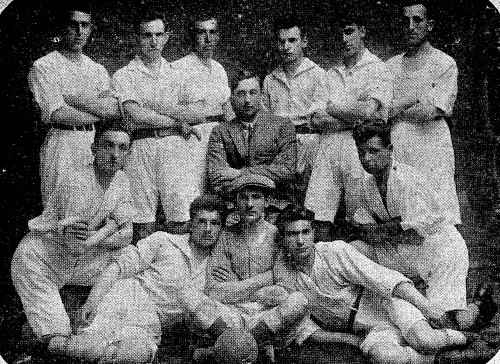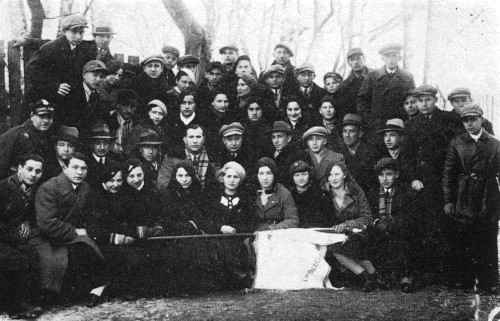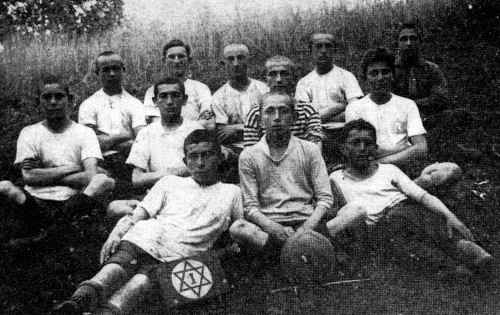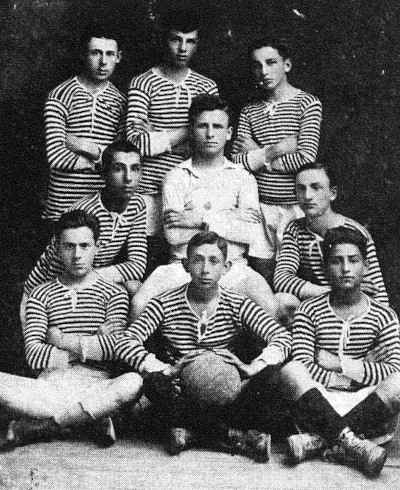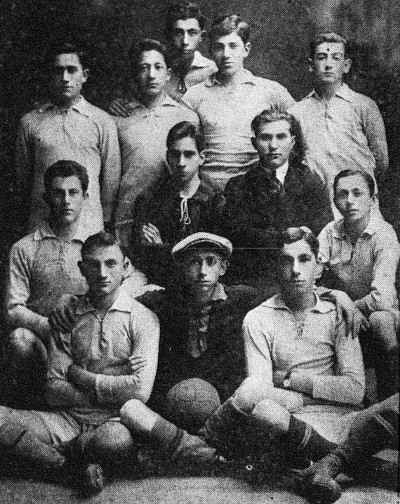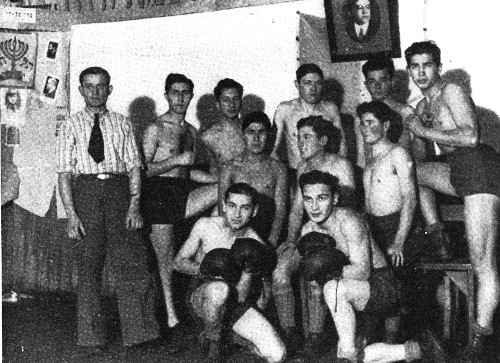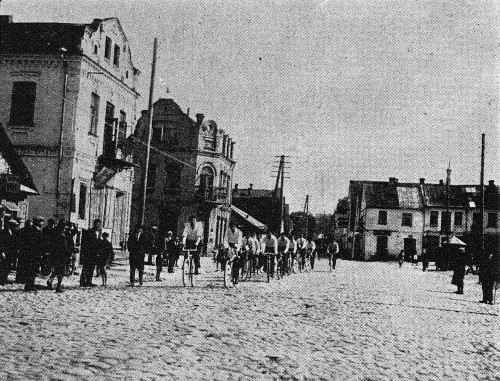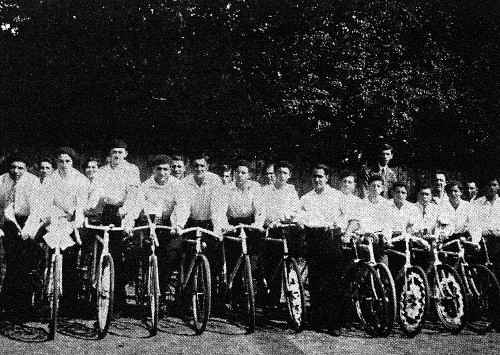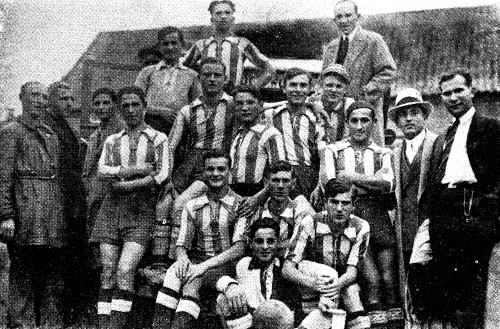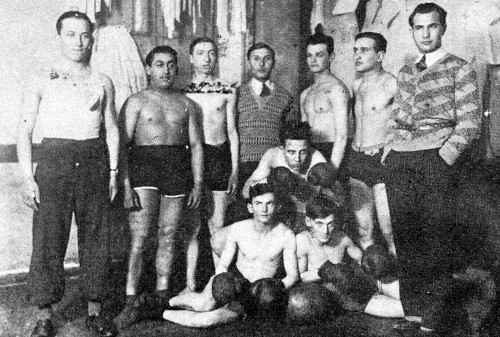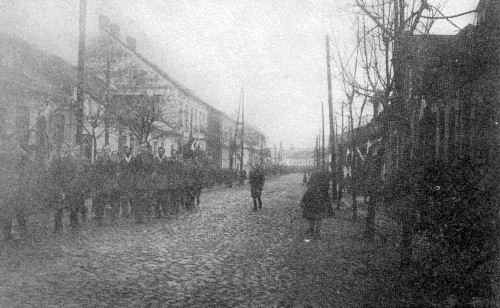[Page 99]
The Volkovysk Maccabi
All the developments and initiatives, that arose in the larger Jewish world, found leaders and followers in Volkovysk. The great national movement, which in the last several decades has spread all over the world, and which advocated: the development and strengthening of the Jewish physical being through sports events – the Maccabi[1] – also had a branch in Volkovysk, which was very active in a number of areas, and focused considerable energies to the realization of the motto: “A healthy spirit and a healthy body.”
Establishment of Maccabi
|
|
The First ‘Maccabi’ Soccer Team in Volkovysk
Right to Left, First Row Bottom: Mulya Schein, Yankel Goldberg (Kvachuk), Yud'l Shpak
Second Row: Yud'l Rip, Min'yeh Goldenberg, Pay'eh Yunovich
Third Row: Volya Lazarovsky, Yankel Zuckerman, Shlomo Shipiatsky, Nionia Khvalovsky, Chaim Yud'l Shipiatsky, Sholom Hubar |
|
|
Members of ‘Maccabi’
Right to Left, First Row Seated: Malka Polonsky (Shalakhmones's), Malka Rutchik, Miss Lipiak, A grandchild of Voliarsky, Gittl Ein, Nechama Lipiak, Chay'cheh Sokolsky, Sakhar Enosh, Joseph Mordetsky
Second Row, Seated: Chaim Khvonyik, Joseph Mostkov, Kalman Bialosotsky, Nionia Khvalovsky, The President, Dr. David Trop, Vice-President Mulya Schein, Saul Markus, Moshe'keh Movshovsky, Avra'sheh Offenberg, Tzirulnitsky (in uniform)
In the top rows can be found: Bashitsky, Israel Tchopkin, Mottel Levin (Koval), Moteleh Shifran, Milikovsky, Lastovsky, Moshe'l Liev, Yehoshua Patsovsky (The Barber's Son), Zaydl Marotchnik, Mopsik, Weinstein |
The Volkovysk [chapter of] Maccabi was founded in the middle of the twenties of the current [sic: twentieth] century. The love of sport had already begun to put down roots among various circles of Jewish young people, only there was nobody to offer encouragement to these young people, and show them the way to the organization of national Jewish sports development. It just happened, that Min'yeh Goldenberg came to Volkovysk at that time from another city, who married a Volkovysk girl, Milia Khirurg (from the mill). She worked as a nurse[2] in the Jewish hospital, and belonged to a kruzhok of young people – a group of Jewish young folks in Volkovysk. Min'yeh Goldenberg, who involved himself deeply in sports activities in his home town, through his wife, became friendly with the coterie of her Volkovysk friends, and he began to teach them
[Page 100]
to play soccer, and he organized matches between them and the Polish soccer group which existed at that time in Volkovysk. At that time, Dr. David Trop (the Dentist), Dr. P. Bebchuk and Mulya Schein, came and organized these young Jewish sports lovers into a Maccabi organization. Sioma Gallin approached the “Joint,” and was able to secure funds with which to buy the necessary sporting equipment.
At first, the Maccabi membership would meet in private houses. They would practice in the large field behind the Hebrew Volksschule near the Jewish hospital. During the period when Maccabi developed and expanded its activities, it rented its own quarters. The headquarters of Maccabi at various times was at Zilberman's (on the Millner Gasse), in Khvonyik's house (on the Millner Gasse), at Yanovsky's of the tobacco business (on the Wide Boulevard), and on Kosciuszko (Ostroger) Gasse.
Maccabi Divisions
Maccabi began modestly. With a soccer team, and little by little, it grew until it encompassed all manner and forms of gymnastics and sports. The Volkovysk Maccabi had divisions for ping-pong, tennis, fencing, basketball, hockey, running, ice-skating, bicycle racing, Swedish gymnastics, and light athletics (discus throwing, pole vaulting) swimming, etc. Development continued uninterrupted until the Bolshevik occupation in the last [sic: First] World War. A “Junior Division” (for 12 year-olds) has also existed in Maccabi since 1936 for training. In the year 1938, a year before the outbreak of that gruesome war that led to the annihilation of the Volkovysk Jewish community, Maccabi established a boxing section. In that same year (1938), Maccabi also founded a training section for women. The women's division would often arrange get-togethers for the groups, meets and discussions. Among the active members of the women's division were: Shifra Rubinstein, Nechama Lipiak, Chay'cheh [sic: Chaya] Sokolsky, Malka Polonsky (from the Shalakhmoneses), Nechama Bitensky, Riva Mordetsky, Golda Eisenstein, and Sonya Goldrei.
The Maccabi Activists
Among the leaders and directors of Maccabi, at various, times were: Dr. David Trop, president of Maccabi in the last years before the War; Dr. P. Bebchuk, the Maccabi doctor; Mulya Schein, vice-president; Tzirel Tzirulnitsky, instructor for light athletics; Moshe Shereshevsky, instructor for the cycling division; Lieutenant Khoronzhy[3] Shivak (of the Third Polish Battalion, stationed in Volkovysk), fencing instructor; Ehrenburg, soccer instructor; Min'yeh Goldenberg, captain of the soccer team; Joseph Mordetsky, head of the soccer players in the final years before the war; Israel Turiansky, sports leader in Maccabi (in the final years); Waklik (a Christian), instructor for the boxing team.
At various times, the following were in the leadership: Yankel Zuckerman, Nionia Khvalovsky, Joseph Dworetsky, Prof. Bazer, Chaim Khvonyik, Dr. Yitzhak Weinberg, Director H. Grossbart, Mostkov, Moshe'l Matskevich, Davidovsky, Chaim Yud'l Shipiatsky, Yitzhak Tchopper, and Mordechai Lev.
[Page 101]
The Volkovysk Maccabi chapter also developed a visible cultural program. It arranged for lectures (about sports topics, Zionist issues and issues of general Jewish interest), gymnastics courses, presentations, and instituted a reading room. But the principal activity of Maccabi, understandably, was sports. It demonstrated the capacity to attract about two hundred young people from all walks of life into active membership – apart from a set number of patrons and supporting members who helped Maccabi with its important program.
The Soccer Team
|
|
One of the First Soccer Teams of Maccabi
Right to Left, First Row Bottom: Yud'l Pereminsky, Boruch Beckenstein, Shaul Markus (Medic)
Second Row: Unknown, Simcha Goldberg, Moshe'l Weinstein, Beckenstein
Third Row: Berel Davidovsky, Gershon Burstein, Moshe Langbord, Tzal'yeh Kilikovsky, Paveh |
Members of the Maccabi Soccer Team at various times were: Volya Lazarovsky, Yankel Zuckerman, Shlomo Shipiatsky, Nionia Khvalovsky, Chaim Yud'l Shipiatsky, Sholom Hubar, Pay'eh Yunovich, Yankel Goldberg, Yud'l Shpak, Shaul Markus, Yerusalimsky (son of the Shokhet), Yud'l Pereminsky, Yankel Shipiatsky, Yankel Gershuni, Archik Podolinsky, Ben'yeh Berg, Tzirel Tzirulnitsky, Sakhar Enosh, Abraham Bayer, Ravitz, Zapoliansky, Liova Glickfeld, Yitzhak Alpert, Hertz, Yosh'keh Galiatsky, Yehoshua Patsovsky, Moshe'l Lev, Zaydl Marotchnik, Mopsik, Lastovsky, Milikovsky, Bashitsky, Yisrael Tchopkin, Mottel Levin (Koval), Kalman Bialosotsky, Avra'sheh Offenberg, Moshe Movshovsky, and Yisrael Markus.
The well-known soccer players among the Maccabi membership were: Joseph Mordetsky, Moshe Langbord (Graf), Yisrael Turiansky, Shlomo Shpak, Moshe'l Weinstein, Ozer Khmelnitsky, Yud'l Pereminsky, G. Kaplan (from Svislucz), Boruch Beckenstein, Mordechai Mordetsky, Mottel Shifran, Herschel Volsky, Vi'tcheh Kalir, L. Leferer, and Tzirulnitsky.
Other Maccabi Divisions
|
|
A Maccabi Soccer Team from the Year 1926
Right to Left, First Row Bottom: Shlomo Shpak, Boruch Beckenstein, Hertz
Second Row: Moshe Langbord, Captain of the Team (a Christian), Berel Davidovsky
Third Row: Liova Glickfeld, Chaim Khvonyik, Yitzhak Alpert |
|
|
A Maccabi Soccer Team
Right to Left, First Row, Bottom: Berel Davidovsky, Boruch Beckenstein, Moshe Langbord
Second Row: Yud'l Pereminsky, Mulya Schein, Yankel Shipiatsky, Yankel Gershuni
Third Row: Moshe'l Weinstein, Ozer Khmelnitsky, Shaul Markus, Aryeh Yerusalimsky (Yerushalmi), Herschel Volsky |
[Page 102]
|
|
A Maccabi Boxing Team
Right to Left – First Row, from the Bottom: Eliezer Sukenik, Moshe Kovensky
Second Row, Standing: Eliezer Pitotsky, Nachman Shalkovich, Zalman Marantz
Third Row, Standing: Kalman Shalkovich, Mendel Steinman, Chaim Scharf, Aharon Grodzhensky, Moshe Moorstein, David Shifran |
|
|
A Race of Maccabi Cyclists on the Grodno Gasse |
|
|
The Maccabi Cycling Division
Right to Left: Zlotnitsky, Applebaum, Mottel Levin (Koval), Einstein, Kossowsky, Yankel Zuckerman, Chaim Kaplan, Yankel Botvinsky, Shifran, Moshe Shereshevsky, Geller, Yos'keh Galiatsky, Chaim Khvonyik |
In 1932, in the Hockey Division, the following were active: Mottel Shifran, Joseph Mordetsky, Moshe Shereshevsky, Moshe Katzin and Yisrael Tchopkin.
The following participated in the Boxing Team: Moshe'l Shereshevsky, Zapoliansky, Tzirel Tzirulnitsky, Lapin, Pesach Segal, Yankel Kaplan, Tzemakh and Mazya.
In the Cycle Racing Section, the following took part: Zlotnitsky, Mottel Levin (Koval), Kossowsky, Yankel Zuckerman, Shifran, Moshe Shereshevsky, Geller, Yos'keh Galiatsky, Shifran, Chaim Khvonyik, Yankel Botvinsky, Einstein, and Simcha Gandz.
The following took part in the Skiing Division: Enosh, Leibush Levin (from the finished goods), Chaim Pines, Tchopkin, Sakhar Enosh, Miunik[4] Zilberman, Archik Podolinsky, Volsky, Zapoliansky, Chaim Mordetsky, Vakulik, the Instructor, Mulya Schein, Grisha Kaplan, Boruch Beckenstein, Yoss'l Galiatsky, Chaim Kaplan, Lastovitsky, Vi'tcheh Kalir, Pesach Segal and Moshe'l Shereshevsky.
In addition to Maccabi, in Volkovysk there also were: the ‘Morgenstern’ Sports Organization (offered by the Bund); the J.K.S. Sports Organization, and a revisionist soccer team, called ‘Nurdiyah.’ Among the active members of Nurdiyah were: Mrs. Rachel Lev, Dr. Menashe Niemchik, Appl[icant]. Mezheritzky, Prof. Birnbaum, Abraham Offenberg, Chaim Pines, Tzirulnitsky, Daniel and Sukenik.
Notwithstanding the fact, as you can understand, that Maccabi was suffused with nationalist and Zionist ideology, and that its members wore blue and white shirts as a uniform, it was nevertheless not a purely Zionist organization. And, indeed, for this reason, it drew members and sympathizers from all elements of the Jewish populace – of all ages and both sexes. The language used by Maccabi during practice was either Polish or Yiddish. The Maccabi budget was covered from the following sources: membership dues, balls, music and dance evenings (with invited performers), ‘Fifes’ with special programs arranged by Maccabi in their own Hall, lotteries, sporting events (ice hockey), Maccabiahs, various undertakings in honor of Jewish festivals, matches with other sports organizations, etc.
[Page 103]
Soccer Matches
|
|
The Volkovysk Maccabi Soccer Team Before the Second World War
Right to Left, First Row, Bottom: Israel Turiansky, Unknown, Kaplan, Zapoliansky, Joseph Mordetsky (with the Soccer Ball in the center)
Second Row: Mulya Schein, Dombrovsky, Archik Podolinsky, Genya Berg, Tzirel Tzirulnitsky, Issachar Enosh, Abraham Bayer, Weinstein, Unknown, Unknown, Unknown
Third Row: Nionia Khvalovsky |
|
|
A Maccabi Boxing Team
Right to Left, First Row, Bottom: Yankel Kaplan, Tzemakh, Mazya
Second Row: Mulya Schein, Moshe'l Shereshevsky, Zapoliansky, Tzirel Tzirulnitsky, Lapin, Pesach Segal, Vakulik (The Instructor) |
|
|
March of the Soccer Team on the Wide Boulevard |
The Volkovysk Maccabi Chapter developed itself to such a high degree, that it was able to participate in matches not only with the other Maccabi chapters and other Jewish sports organizations from Grodno, Baranovich, Slonim, Bialystok, Suwalk, Lomza, Svislucz, Lida, and other cities, but also with Polish sports organizations from Volkovysk and the vicinity. The matches, which mostly took place on Saturday and Sunday, would attract a large audience (a crowd as large as 1,500 people would often come to the matches), which would incidentally bring its own enlivenment to the city. When a match was scheduled with a Polish sports organization the city would start to bubble, and the emotions would start to run high. Everyone awaited the outcome of the match with great impatience, and everyone whispered a silent prayer in their hearts that our Maccabi team would emerge victorious, and thereby bring glory and prestige to the Jewish sports initiative and to the Jewish name. And the Volkovysk Maccabi team mostly endured this test with honor, and it would frequently beat well-known strong sports organizations. Thus, for example, The Volkovysker Leben provides a news report of a match that took place between Volkovysk Maccabi and the strong Volkovysk Polish sports organization, ‘Psziszlucz’ – Maccabi winning 4 to 1. In that same previously mentioned newspaper, news is reported concerning a match that took place between Volkovysk Maccabi and the military sports club of Grodno, and about yet another match between the Volkovysk Maccabi and the ‘Morgenstern’ sports organization of the Bund.
The matches took place on the field near the barracks and on the municipal sports field (near the Poritzisher Gasse) on the road to Izavelin.
Volkovysk Maccabi had great visibility, not only among the Jewish populace, but also among the non-Jewish residents of Volkovysk and in district circles. Maccabi was invited to participate in all official state holidays, such as May 3 (Official National Holiday of the Polish Republic) and on Pilsudski's birthday – Maccabi was invited and would participate in the parades that were held, together with all other organizations, who marched in their official uniforms.
On the occasion of the tenth anniversary of Maccabi in Volkovysk, a large parade was held through all the streets of the city with the participation of the Maccabi orchestra. The leaders of all sports organizations in Volkovysk and vicinity attended. By official invitation, which was arranged in honor of the tenth anniversary, there were official representatives of the Polish government and the military in attendance.
* * *
Volkovysk Maccabi continued to exist and make an impact until that time when God's wrath was poured out on our beloved city, and annihilated all the Volkovysk Jews, and along with them, Volkovysk Maccabi.
Translator's footnotes:
- Based on information I received from Yankel Zuckerman and Moshe'l Shereshevsky, and from news articles that were published in The Volkovysker Leben. – Dr. M. Einhorn Return
- It is interesting to note that the name Khirurg, is the Hebrew word for a surgeon. It underscores the taking of last names that relate to actual occupations. Return
- Despite the explicit presence of the word ‘Lieutenant’ in the text, there is some question as to whether this representation is accurate. A Khoronzhy originally meant a person who carried the flag in a military procession. In modern Polish military parlance, it is a very high form of non-commissioned officer, something like our sergeant-major or chief warrant officer in the army. A khoronzhy is not a lieutenant. A first lieutenant is a porucznik. An under-lieutenant, similar to our second lieutenant is a podporucznik. Return
- A variant of Munya, used with either Shlomo (Solomon), Mordechai, or Asher. Return
This material is made available by JewishGen, Inc.
and the Yizkor Book Project for the purpose of
fulfilling our
mission of disseminating information about the Holocaust and
destroyed Jewish communities.
This material may not be copied,
sold or bartered without JewishGen, Inc.'s permission. Rights may be
reserved by the copyright holder.
JewishGen, Inc. makes no representations regarding the accuracy of
the translation. The reader may wish to refer to the original material
for verification.
JewishGen is not responsible for inaccuracies or omissions in the original work and cannot rewrite or edit the text to correct inaccuracies and/or omissions.
Our mission is to produce a translation of the original work and we cannot verify the accuracy of statements or alter facts cited.
 Vawkavysk, Belarus
Vawkavysk, Belarus
 Yizkor Book Project
Yizkor Book Project
 JewishGen Home Page
JewishGen Home Page
Yizkor Book Director, Lance Ackerfeld
This web page created by Jason Hallgarten
Copyright © 1999-2025 by JewishGen, Inc.
Updated 25 Sep 2022 by LA
